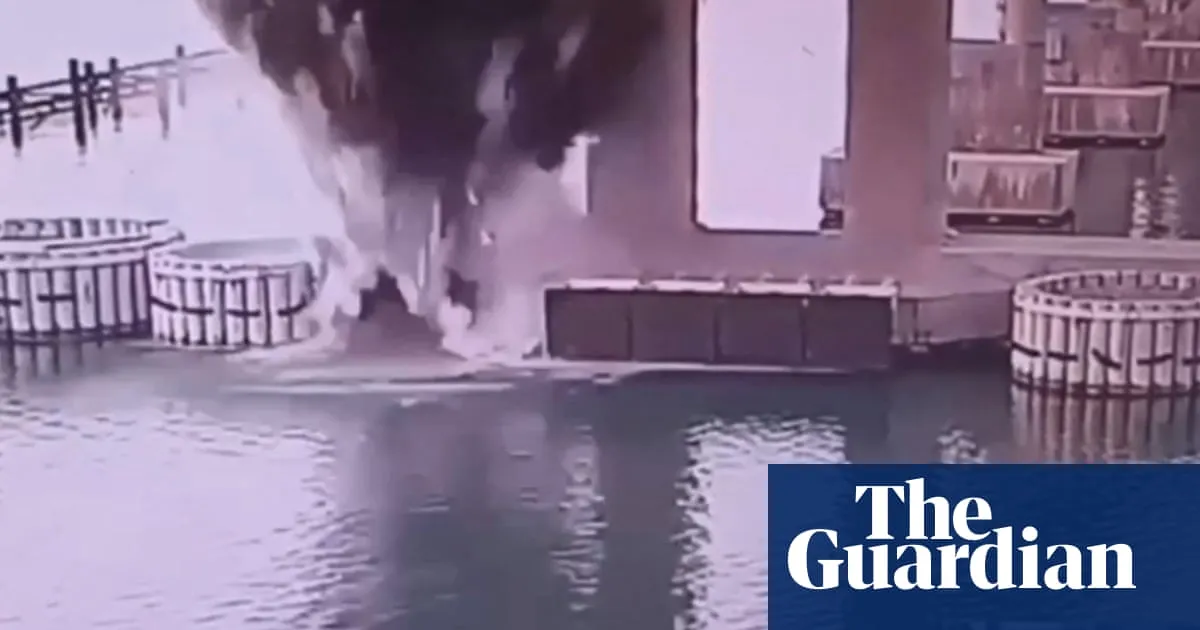
Ukraine has executed a significant underwater explosion aimed at the crucial road and rail link, the Kerch Bridge, connecting the Russian-occupied Crimean peninsula to mainland Russia. This operation, attributed to Ukraine's SBU security service, has inflicted damage on the bridge's underwater supports, highlighting a strategic move amidst ongoing conflict. This strike marks the second major operation by Ukraine in just a few days, following a sophisticated drone attack on Moscow’s strategic bomber fleet that occurred on Sunday.
The timing of this attack is particularly notable as Ukraine has confirmed its invitation to the upcoming NATO summit later this month. Ukrainian President Volodymyr Zelenskyy emphasized that not attending would be perceived as a “victory” for Russia. The assault on the 12-mile-long Kerch Bridge, a prestigious project inaugurated by Russian President Vladimir Putin in 2018, is part of Ukraine's efforts to reshape the narrative surrounding its position in the ongoing war, countering claims from the Trump administration that Ukraine has limited leverage.
The SBU has disclosed that the operation against the Kerch Bridge was meticulously planned over several months and utilized over a metric tonne of TNT. The agency reported that the blast has “severely damaged” the bridge's supports, a significant logistical route for Russian forces. This incident represents the third time Ukraine has targeted this vital infrastructure since Russia's full-scale invasion began in 2022. Previous attacks occurred in October 2022 and July 2023, both of which resulted in temporary closures and repairs by Russian authorities.
Lt Gen Vasyl Maliuk of the SBU, who oversaw the latest operation, categorized the bridge as “an absolutely legitimate target,” particularly given its role in supplying Russian troops. He asserted, “Crimea is Ukraine, and any manifestations of occupation will receive our tough response.” The SBU also released footage showcasing the dramatic explosion and subsequent debris, while Russian authorities temporarily suspended road traffic on the bridge for several hours following the attack.
In a related development, Russia's state investigative committee accused Ukraine of committing “acts of terrorism” due to the destruction of two railway bridges in Russia over the weekend. These attacks resulted in tragic casualties, with seven people dead and 113 injured, including children, following two train collisions caused by the blasts.
On the diplomatic front, Russia has indicated that expectations for quick breakthroughs in Ukraine peace talks may be unrealistic. Following Ukraine's call for an unconditional ceasefire, Moscow proposed a partial truce lasting two to three days in certain frontline areas. Kremlin spokesperson Dmitry Peskov emphasized the complexity of the settlement, stating, “It would be wrong to expect immediate solutions and breakthroughs.”
During recent discussions, both sides agreed to a significant swap of captured soldiers and shared their respective peace roadmaps, also known as “memorandums.” Russian media reported that Moscow is demanding Ukraine withdraw its troops from four annexed regions as a precondition for pausing its offensive. Meanwhile, Andriy Yermak, Zelenskyy’s chief of staff, has arrived in the United States to discuss increased military support and tougher sanctions against Russia.
The prospect of a summit involving the leaders of Russia, Ukraine, and the United States remains uncertain. Peskov indicated that such a meeting is unlikely until an agreement is reached between negotiators. However, the White House has mentioned that President Donald Trump is “open” to the idea, which has garnered support from both Zelenskyy and Turkish President Recep Tayyip Erdoğan.
Zelenskyy welcomed the invitation to the NATO summit scheduled for June 24-26, reaffirming its importance amidst concerns about potential misunderstandings with Trump administration officials. “We were invited to the NATO summit. I think this is important,” he remarked after discussions with NATO Secretary General Mark Rutte in Vilnius.